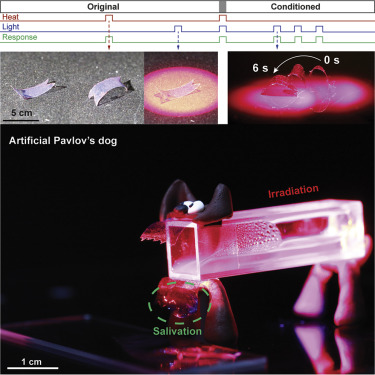Matter ( IF 17.3 ) Pub Date : 2019-12-04 , DOI: 10.1016/j.matt.2019.10.019 Hao Zeng 1 , Hang Zhang 2 , Olli Ikkala 2 , Arri Priimagi 1

|
Responsive and shape-memory materials allow stimuli-driven switching between fixed states. However, their behavior remains unchanged under repeated stimuli exposure, i.e., their properties do not evolve. By contrast, biological materials allow learning in response to past experiences. Classical conditioning is an elementary form of associative learning, which inspires us to explore simplified routes even for inanimate materials to respond to new, initially neutral stimuli. Here, we demonstrate that soft actuators composed of thermoresponsive liquid crystal networks “learn” to respond to light upon a conditioning process where light is associated with heating. We apply the concept to soft microrobotics, demonstrating a locomotive system that “learns to walk” under periodic light stimulus, and gripping devices able to “recognize” irradiation colors. We anticipate that actuators that algorithmically emulate elementary aspects of associative learning and whose sensitivity to new stimuli can be conditioned depending on past experiences may provide new routes toward adaptive, autonomous soft microrobotics.
中文翻译:

液晶网络执行器中经典条件的关联学习。
响应性和形状记忆材料允许在固定状态之间进行刺激驱动的切换。然而,它们的行为在反复的刺激暴露下保持不变,即,它们的特性不会演变。相比之下,生物材料可以根据过去的经验进行学习。古典条件是联想学习的一种基本形式,它激发我们探索简化的途径,甚至是无生命的材料也可以响应新的,最初是中性的刺激。在这里,我们演示了由热响应液晶网络组成的软执行器“学习”在光与加热相关的调节过程中对光做出响应。我们将该概念应用于软微型机器人,演示了在周期性光刺激下“学会走路”的机车系统,以及能够“识别”辐照颜色的抓取装置。











































 京公网安备 11010802027423号
京公网安备 11010802027423号